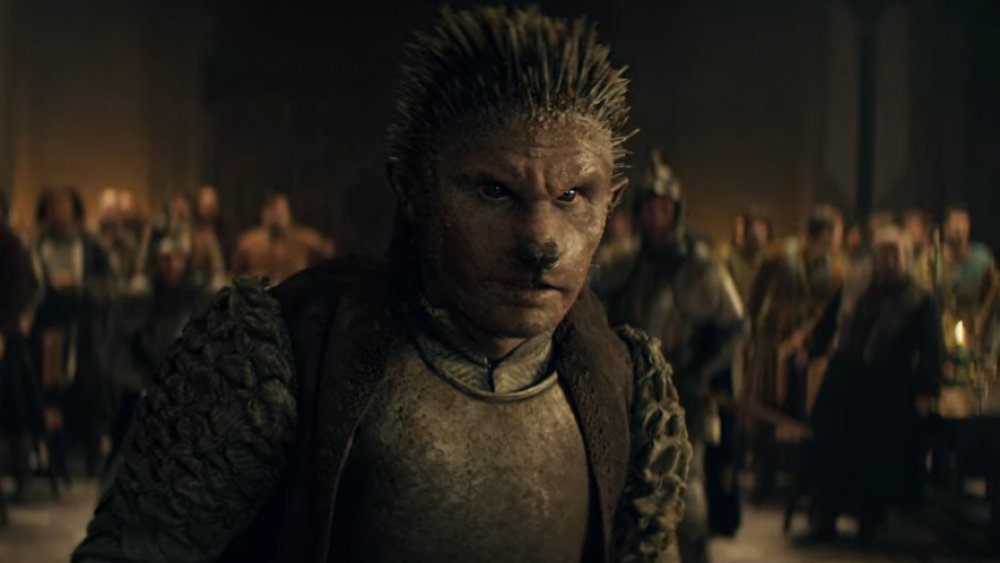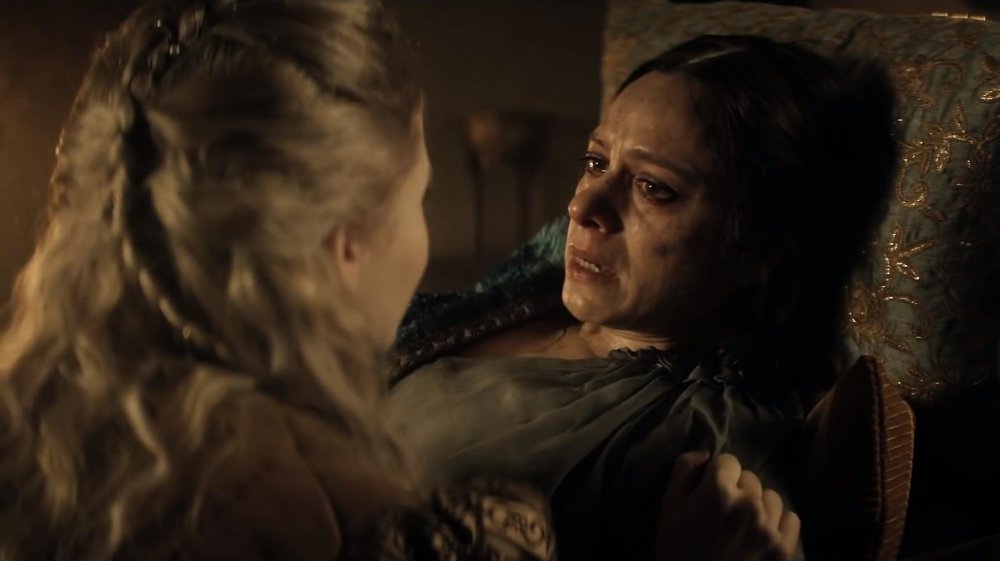The Witcher's Law Of Surprise Explained
In the inaugural season of Netflix's The Witcher, the Law of Surprise is the hinge upon which the entire plot twists — but for those coming to the series having no familiarity with the video games or the novels on which they're based, it may seem a bit confusing. The nonlinear narrative format is an interesting and well-executed turn for a fantasy series simmered in the concept of fate, but it can make Geralt and Ciri's linked destiny a tad difficult to follow on the first go-around.
The author of the novels, Andrzej Sapkowski, uses traditional, mostly Slavic folklore and parables for adding layers (and a bevy of monsters) to his world, and the Law of Surprise falls within that category. The reddit thread for fans of the Netflix show have been trading cultural examples of the parable among themselves as a means of helping explain it to others. When Geralt says at the Feast of Cintra that the Law of Surprise is as old as history itself, he's poking through the fourth wall a little bit for the audience's benefit.
What does the Law of Surprise mean, then, to our world and our history — and just how does it come together to be such a big deal for Geralt and the world of The Witcher? Let's find out, and please be advised that spoilers for the first season of The Witcher follow.
The real history of the Law of Surprise
The concept of has taken many forms across a lot of cultures' folklore, but it basically boils down to this: in exchange for an unpayable debt (usually, saving someone's life), the person who invokes the law is demanding the benefit of the target's unexpected luck. This can be anything — a bumper crop, a foal, a child — but the trick is that the item is bestowed by luck and fate, and is unknown to the person giving the item away until they return home safely.
For example, many parables involve the trope of a nobleman traveling and having their life saved by someone of lower birth; rather than accept the immediacy of gold or other form of material wealth, the peasant will invoke the Law of Surprise, which leads to the nobleman having to give up something far more precious, usually a child. When the nobleman grows selfish and attempts to thwart this invocation of fate by either trying to pay the peasant off or attempting to kill them, terrible things befall them.
Tales using this trope are meant to highlight the virtues of selflessness and humility — good people and kings honor their bargains, even when the cost is exceedingly high, and the universe should punish those who do not. The Witcher series employs a particular interpretation of the Law of Surprise that closely resembles a version by The Brothers Grimm, in which a man born as a half-hedgehog rescues two different kings from being lost in a forest. The man uses the Law of Surprise on both; one denies him, and the hedgehog-man punishes the daughter with a curse. The second king honors the bargain and marries off his princess, which ultimately turns the hedgehog man into a full human. Sounds a bit familiar, right?
The Law of Surprise in The Witcher
From start to finish, here's how the Law of Surprise comes into play in the first season of The Witcher. Many years before the events of the series, Lord Urcheon, humble knight of the realm, saves King Roegner of Ebbing from death. With extreme humility, Urcheon insists he needs no material benefit for doing so, but upon the king's continued pressure, chooses the Law of Surprise as his repayment, never once imagining it would mean the unborn child of Roegner and Calanthe.
Having been cursed to look like a hedgehog from a young age, Urcheon did his best to stave off the fate the Law of Surprise demanded until his curse lifted — hearing the twelfth peal of a bell in the course of his life. Fate, of course, intervenes, and Urcheon meets Princess Pavetta seemingly by chance, and they fall in love. Their secret betrothal is what drives him to interrupt the Feast of Cintra, demanding what is his by ancient right.
Queen Calanthe gets mad, there's that big fight, and Geralt steps in directly to save Urcheon's life twice in succession. When Calanthe finally relents, Urcheon insists just as the king had done years before to repay Geralt for his intervention. Geralt, believing all this to be traditionalist nonsense, chooses the Law of Surprise over literally everyone else's interruption that maybe, Geralt buddy, you should think it through.
Alas, he does not, and the cheeky revelation of Pavetta vomiting immediately afterward reveals her pregnancy. Ciri is on the way, and Geralt refuses to recognize what he has wrought for himself. He mocks the concept of destiny openly over his friend Mousesack's warnings, and leaves... to his continued and countless future troubles. It's only when he accepts his responsibility under the Law of Surprise that he is put at ease.
The price of denying the Law of Surprise
When the first episode ends, the audience is meant to have a lot of sympathy for Calanthe. She clearly loves her family as well as her nation, and attempted to act in what she believed was its best interest. Over the spread of the subsequent seven episodes, however, we come to learn just how complicated the queen's legacy is.
Her subjects respect her, but do not love her; were it not for the fear that drove her to shelter Ciri, she would have continued to be the wrathful imperialist we see at the Feast of Cintra. Geralt is sympathetic, too; he is a man of forced circumstances, living a life he had no choice in and basically waiting to die, though he strives to at least be effective in his profession. His scintilla of hope for something better through Yennefer is lost precisely because of the selfishness through which he employed the Law of Surprise — thinking he'd cheated someone out of a child he could never bear himself with no consequences, and when it got tough, abandoning Ciri to a much uglier fate than necessary.
Both Geralt and Calanthe thought destiny was hogwash, tried to abuse others' belief in it for their own ends, and ended up severely punished for it. The punishment is what engenders belief in fate — but too late for Calanthe, and almost so for Geralt. Ciri is consequential both because of the potent magical bloodline she belongs to as well as her unknown attachment to Geralt through what amounts to his own selfish stupidity. It's much more than a simple bit of moral instruction to the world of The Witcher: it's magic making itself known in its world, and the mortals within it are merely shifting among its tides.



